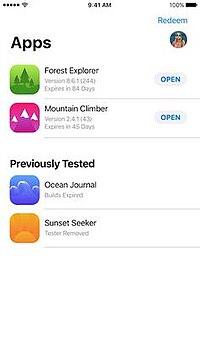TestFlight
 TestFlight app running on an iPhone | |
| Original author(s) | Benjamin Satterfield Trystan Kosmynka |
|---|---|
| Developer(s) | Apple Inc. |
| Stable release | 2.7.0
/ August 17, 2020[1] |
| Operating system | iOS tvOS iPadOS |
| Type | Application testing service |
| License | Freeware |
| Website | developer |
TestFlight is an online service for over-the-air installation and testing of mobile applications, currently owned by Apple Inc and only offered to developers within the iOS Developer Program.[2][3][4] Developers sign up with the service to distribute applications to internal or external beta testers, who can subsequently send feedback about the application to developers.[5][6][7] The TestFlight SDK additionally allows developers to receive remote logs, crash reports and tester feedback.[8]
TestFlight initially supported testing of Android and iOS applications, but since March 2014, Apple has retracted support for Android.[9][10] As of 2015, applications must be published for TestFlight using Xcode, and testers must be invited using iTunes Connect.[5] After invitation, up to 25 internal testers (with up to 10 devices each) and 10,000[11] external beta testers can download and test the application build. Up to 100 apps can be tested at a time, internally or externally.[5] Testers may be grouped and separate builds created for each group.[5] The TestFlight application for iOS notifies testers when new builds are available, features to focus on, and enables sending of feedback.[5]
History
TestFlight was founded by Benjamin Satterfield and Trystan Kosmynka on December 23, 2010, and was designed as a single platform to test mobile applications on Android and iOS devices.[12][13] It was acquired by Burstly in March 2012, and thereby gained the resources necessary to launch TestFlight Live.[12][13] TestFlight Live enabled developers to receive install rates, purchase rates and other monetization data from final builds of the application, even after beta testing concluded.[12]
In 2011, Burstly raised $7.3 million from Upfront Ventures, Rincon Venture Partners, Softbank Capital and others.[10] Apple Inc. acquired Burstly in February 2014, and terminated support for Android as of March 2014.[9][10] Apple also shut down FlightPath (a mobile analytics solution and a replacement to TestFlight Live) and SkyRocket (a mobile application monetization platform) the same month.[10][14]
References
- ^ "TestFlight". App Store. Retrieved September 23, 2019.
- ^ Developing Enterprise iOS Applications: iPhone and iPad Apps for Companies, O'Reilly Media, Inc., December 12, 2011
- ^ Apple confirms that it has acquired TestFlight creator Burstly, TheNextWeb
- ^ TestFlight has moved, Apple Computer
- ^ a b c d e TestFlight Beta Testing, Apple Computer
- ^ Architecting Mobile Solutions for the Enterprise, O'Reilly Media, Inc., May 14, 2012
- ^ Swift Development with Cocoa: Developing for the Mac and IOS App Stores, O'Reilly Media, Inc., December 10, 2014
- ^ Game Development for iOS with Unity3D, CRC Press, July 26, 2012
- ^ a b Apple to close the old standalone TestFlight beta testing service next month, TheNextWeb
- ^ a b c d TestFlight Owner Burstly Acquired By Apple, TechCrunch
- ^ "Apple expands TestFlight tester limit to 10,000 users". 9to5Mac. July 31, 2017. Retrieved September 15, 2017.
- ^ a b c TestFlight, CrunchBase
- ^ a b Why Did TestFlight Sell To Burstly? “We Couldn’t Change The App Ecosystem Alone”, TechCrunch
- ^ After Apple Acquisition, Burstly’s SkyRocket Users Get 90-Day Notice, TechCrunch
